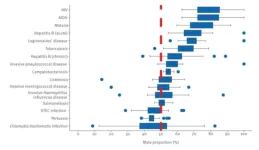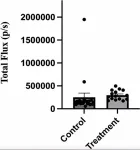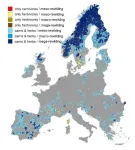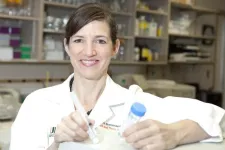(Press-News.org) The review, led by Imperial College London’s Professor Hippolite Amadi, argues that Nigeria’s own discoveries and technological advancements of the past three decades have been “abandoned” by policymakers.
The authors argue that too many Nigerian newborns, clinically defined as infants in the first 28 days of life, die of causes that could have been prevented had policymakers adopted recent in-country scientific breakthroughs.
Led by Professor Amadi of Imperial’s Department of Bioengineering, who received the Nigeria Prize for Science (NPS) in 2023, the researchers say the lack of adoption and scale up of breakthroughs in treatment beyond Nigeria’s major cities might partly explain the country’s consistently high infant mortality rate.
Figures from the World Health Organization show that globally, 6,500 newborns die every day, and that sub-Saharan Africa experiences the highest neonatal mortality rate in the world at 27 deaths per 1000 live births.
In addition, a child born in sub-Saharan Africa, a region that includes Nigeria, is 11 times more likely to die in their first month of life than one born in Australia and New Zealand, which is the lowest-mortality region.
Lead author Professor Amadi, who received the NPS for his work on low-cost newborn care systems in the West African nation, said: “Nigeria has the power to reduce its own infant mortality rate. We already possess the necessary knowledge and technology, cultivated by decades of Nigerian research and innovation.
"We need to put the policies and leadership in place to make these improvements where they are needed most, so we can reduce the soaring numbers of infant deaths in the country.”
The review is published in Frontiers in Pediatrics.
"Game-changing science"
Nigerian clinicians and researchers have developed several low-cost advances in neonatal care in recent years. These include adaptive care pathways for premature births, an innovative respiratory support mechanism for newborns with low birth weight, and solar powered intensive phototherapy machines for treating neonatal jaundice.
However, access to neonatal care exists mainly in major cities, where most hospitals with neonatal care units are located, and is more difficult in rural areas. To address this, the researchers argue that policymakers should scale up and adopt these strategies nationally.
To carry out the analysis, the researchers examined 4,286 publications for evidence of potential strategies or interventions to reduce infant mortality.
Nineteen of those publications covered potential strategies or interventions to reduce neonatal mortality. Fourteen of these strategies produced significant results during their trials and subsequent usage in hospitals. However, none of these applications were adopted nationally, which the researchers say has denied newborns proper access to these interventions.
The researchers say that Nigeria is an example case study that could be applied to many other low- and middle-income countries (LMICs) that face similar high mortality and morbidity rates, including across West Africa. Professor Amadi added: “All low- and middle-income countries (LMICs) must look inward to strengthen and use what they already possess.
“The continuing failure of the Nigerian system to protect newborns seems to have become a norm, a huge source of nursing fatigue, and an unwelcome situation. Nigeria, and other LMICs like it, already possess the game-changing science and technology to prevent many of its newborn deaths. It’s now in policymakers’ hands to nationally scale up these innovations and accelerate infant survival.”
-
“The case of the neonate vs. LMIC medical academia—a jury-style systematic review of 32 years of literature without significant mortality reduction” by Amadi et al., published 22 July 2024 in Frontiers in Pediatrics.
END
Solutions to Nigeria’s newborn mortality rate might lie in existing innovations, finds review
2024-08-15
ELSE PRESS RELEASES FROM THIS DATE:
Study highlights sex differences in notified infectious disease cases across Europe
2024-08-15
A study published in Eurosurveillance analysing 5.5 million cases of infectious diseases in the European Union/European Economic Area (EU/EEA) over 10 years has found important differences in the relative proportion of notified male versus female cases for several diseases. The proportion of males ranged on average from 40-45% for pertussis and Shiga toxin-producing Escherischia coli (STEC) infections to 75-80% for HIV/AIDS.
“Although this study was not able to fully explain the differences observed across countries and diseases, it offers some interesting leads,” said Julien Beauté, principal expert in general surveillance at the European ...
Nanobody inhibits metastasis of breast tumor cells to lung in mice
2024-08-15
“In the present study we describe the development of an inhibitory nanobody directed against an extracellular epitope present in the native V-ATPase c subunit.”
BUFFALO, NY- August 15, 2024 – A new research paper was published in Oncotarget's Volume 15 on August 14, 2024, entitled, “A nanobody against the V-ATPase c subunit inhibits metastasis of 4T1-12B breast tumor cells to lung in mice.”
The vacuolar H+-ATPase (V-ATPase) is an ATP-dependent proton pump that functions to control the pH of intracellular compartments ...
Detecting machine-generated text: An arms race with the advancements of large language models
2024-08-15
Machine-generated text has been fooling humans for the last four years. Since the release of GPT-2 in 2019, large language model (LLM) tools have gotten progressively better at crafting stories, news articles, student essays and more, to the point that humans are often unable to recognize when they are reading text produced by an algorithm. While these LLMs are being used to save time and even boost creativity in ideating and writing, their power can lead to misuse and harmful outcomes, which are already ...
Nearly 25% of European landscape could be rewilded
2024-08-15
Europe's abandoned farmlands could find new life through rewilding, a movement to restore ravaged landscapes to their wilderness before human intervention. A quarter of the European continent, 117 million hectares, is primed with rewilding opportunities, researchers report August 15 in the Cell Press journal Current Biology. They provide a roadmap for countries to meet the 2030 European Biodiversity Strategy's goals to protect 30% of land, with 10% of those areas strictly under conservation.
The team ...
Emergency departments could help reduce youth suicide risk
2024-08-15
A study of over 15,000 youth with self-inflicted injury treated in Emergency Departments (EDs) found that around 25 percent were seen in the ED within 90 days before or 90 days after injury, pointing to an opportunity for ED-based interventions, such as suicide risk screening, safety planning, and linkage to services. Nearly half of ED visits after the self-inflicted injury encounter were for mental health issues.
“Self-inflicted injury is an important predictor of suicide risk,” said Samaa Kemal, MD, MPH, emergency medicine physician at Ann & Robert H. Lurie ...
Uterus transplant in women with absolute uterine-factor infertility
2024-08-15
About The Study: Uterus transplant was technically feasible and was associated with a high live birth rate following successful graft survival. Adverse events were common, with medical and surgical risks affecting recipients as well as donors. Congenital abnormalities and developmental delays have not occurred to date in the live-born children.
Corresponding Author: To contact the corresponding author, Liza Johannesson, MD, PhD, email Liza.Johannesson@bswhealth.org.
To access the embargoed study: Visit our For The Media website at this link https://media.jamanetwork.com/
(doi:10.1001/jama.2024.11679)
Editor’s ...
Adverse childhood experiences and adult household firearm ownership
2024-08-15
About The Study: Consistent with prior research on adverse childhood experience (ACE; defined as abuse, neglect, and household dysfunction before age 18) exposure and presence of a firearm in the household during childhood, this study found that cumulative ACE exposure was associated with higher odds of household firearm ownership in adulthood. The relationship may be due to a heightened sense of vulnerability to physical violence and greater perceived threats to personal safety associated with a traumatic childhood, which lead individuals to seek self-protection.
Corresponding Author: To contact the corresponding author, Alexander Testa, PhD, email alexander.testa@uth.tmc.edu.
To ...
Warning signs: National data indicate that autistic birthing people are at increased risk for postpartum anxiety and depression
2024-08-15
American women have the highest rate of maternal deaths among high-income countries, with outcomes worse for minoritized groups. In an effort to understand the maternal health of pregnant people with intellectual and developmental disabilities, including autism and intellectual disability, researchers from Drexel University’s Policy and Analytics Center in the A.J. Drexel Autism Institute examined Medicaid data to identify perinatal and postpartum outcomes among people with intellectual and developmental disabilities. The study was recently published in JAMA Network Open.
“While ...
Can a mouthwash-based test help predict head and neck cancer recurrence?
2024-08-15
MIAMI, FLORIDA (EMBARGOED UNTIL AUG. 15, 2024 @ 11 A.M. EDT) – For years, mouthwash has been marketed as an essential hygiene item to prevent bad breath, even though it offers minimal if any health benefits.
But what if a mouthwash-based test to detect biomarkers can help physicians predict disease recurrence in head and neck cancer patients?
That futuristic scenario seems closer to reality after a new study by researchers at Sylvester Comprehensive Cancer Center at the University of Miami Miller School of Medicine, UC San Diego Health and collaborating cancer centers.
Their findings, ...
University of Michigan School of Public Health department renamed Health Behavior & Health Equity, reflecting longstanding commitment to health equity
2024-08-15
The Department of Health Behavior & Health Education at the University of Michigan School of Public Health will become the Department of Health Behavior & Health Equity, effective August 15, 2024. The new name reflects the department’s increasing focus on issues of health equity in research, teaching and service.
“Health equity is at the core of our mission and actions in public health,” said F. DuBois Bowman, dean of Michigan Public Health. “I am grateful to the many members of the Health Behavior & Health Equity community ...




